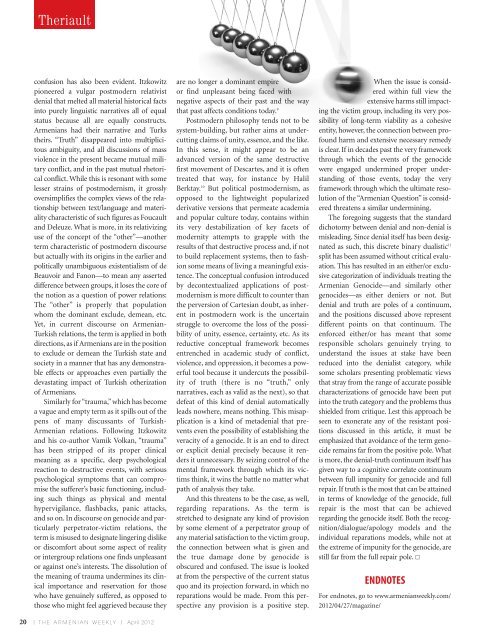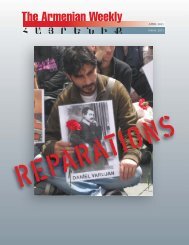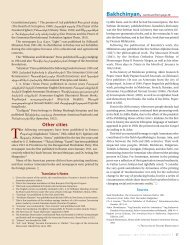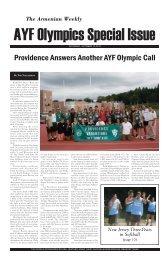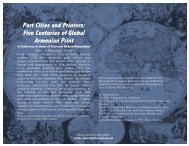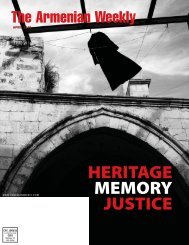Armenian Weekly April 2012 Magazine
Armenian Weekly April 2012 Magazine
Armenian Weekly April 2012 Magazine
Create successful ePaper yourself
Turn your PDF publications into a flip-book with our unique Google optimized e-Paper software.
Theriault<br />
confusion has also been evident. Itzkowitz<br />
pioneered a vulgar postmodern relativist<br />
denial that melted all material historical facts<br />
into purely linguistic narratives all of equal<br />
status because all are equally constructs.<br />
<strong>Armenian</strong>s had their narrative and Turks<br />
theirs. “Truth” disappeared into multiplicitous<br />
ambiguity, and all discussions of mass<br />
violence in the present became mutual military<br />
conflict, and in the past mutual rhetorical<br />
conflict. While this is resonant with some<br />
lesser strains of postmodernism, it grossly<br />
oversimplifies the complex views of the relationship<br />
between text/language and materiality<br />
characteristic of such figures as Foucault<br />
and Deleuze. What is more, in its relativizing<br />
use of the concept of the “other”—another<br />
term characteristic of postmodern discourse<br />
but actually with its origins in the earlier and<br />
politically unambiguous existentialism of de<br />
Beauvoir and Fanon—to mean any asserted<br />
difference between groups, it loses the core of<br />
the notion as a question of power relations:<br />
The “other” is properly that population<br />
whom the dominant exclude, demean, etc.<br />
Yet, in current discourse on <strong>Armenian</strong>-<br />
Turkish relations, the term is applied in both<br />
directions, as if <strong>Armenian</strong>s are in the position<br />
to exclude or demean the Turkish state and<br />
society in a manner that has any demonstrable<br />
effects or approaches even partially the<br />
devastating impact of Turkish otherization<br />
of <strong>Armenian</strong>s.<br />
Similarly for “trauma,” which has become<br />
a vague and empty term as it spills out of the<br />
pens of many discussants of Turkish-<br />
<strong>Armenian</strong> relations. Following Itzkowitz<br />
and his co-author Vamik Volkan, “trauma”<br />
has been stripped of its proper clinical<br />
meaning as a specific, deep psychological<br />
reaction to destructive events, with serious<br />
psychological symptoms that can compromise<br />
the sufferer’s basic functioning, including<br />
such things as physical and mental<br />
hypervigilance, flashbacks, panic attacks,<br />
and so on. In discourse on genocide and particularly<br />
perpetrator-victim relations, the<br />
term is misused to designate lingering dislike<br />
or discomfort about some aspect of reality<br />
or intergroup relations one finds unpleasant<br />
or against one’s interests. The dissolution of<br />
the meaning of trauma undermines its clinical<br />
importance and reservation for those<br />
who have genuinely suffered, as opposed to<br />
those who might feel aggrieved because they<br />
are no longer a dominant empire<br />
or find unpleasant being faced with<br />
negative aspects of their past and the way<br />
that past affects conditions today. 9<br />
Postmodern philosophy tends not to be<br />
system-building, but rather aims at undercutting<br />
claims of unity, essence, and the like.<br />
In this sense, it might appear to be an<br />
advanced version of the same destructive<br />
first movement of Descartes, and it is often<br />
treated that way, for instance by Halil<br />
Berktay. 10 But political postmodernism, as<br />
opposed to the lightweight popularized<br />
derivative versions that permeate academia<br />
and popular culture today, contains within<br />
its very destabilization of key facets of<br />
modernity attempts to grapple with the<br />
results of that destructive process and, if not<br />
to build replacement systems, then to fashion<br />
some means of living a meaningful existence.<br />
The conceptual confusion introduced<br />
by decontextualized applications of postmodernism<br />
is more difficult to counter than<br />
the perversion of Cartesian doubt, as inherent<br />
in postmodern work is the uncertain<br />
struggle to overcome the loss of the possibility<br />
of unity, essence, certainty, etc. As its<br />
reductive conceptual framework becomes<br />
entrenched in academic study of conflict,<br />
violence, and oppression, it becomes a powerful<br />
tool because it undercuts the possibility<br />
of truth (there is no “truth,” only<br />
narratives, each as valid as the next), so that<br />
defeat of this kind of denial automatically<br />
leads nowhere, means nothing. This misapplication<br />
is a kind of metadenial that prevents<br />
even the possibility of establishing the<br />
veracity of a genocide. It is an end to direct<br />
or explicit denial precisely because it renders<br />
it unnecessary. By seizing control of the<br />
mental framework through which its victims<br />
think, it wins the battle no matter what<br />
path of analysis they take.<br />
And this threatens to be the case, as well,<br />
regarding reparations. As the term is<br />
stretched to designate any kind of provision<br />
by some element of a perpetrator group of<br />
any material satisfaction to the victim group,<br />
the connection between what is given and<br />
the true damage done by genocide is<br />
obscured and confused. The issue is looked<br />
at from the perspective of the current status<br />
quo and its projection forward, in which no<br />
reparations would be made. From this perspective<br />
any provision is a positive step.<br />
When the issue is considered<br />
within full view the<br />
extensive harms still impacting<br />
the victim group, including its very possibility<br />
of long-term viability as a cohesive<br />
entity, however, the connection between profound<br />
harm and extensive necessary remedy<br />
is clear. If in decades past the very framework<br />
through which the events of the genocide<br />
were engaged undermined proper understanding<br />
of those events, today the very<br />
framework through which the ultimate resolution<br />
of the “<strong>Armenian</strong> Question” is considered<br />
threatens a similar undermining.<br />
The foregoing suggests that the standard<br />
dichotomy between denial and non-denial is<br />
misleading. Since denial itself has been designated<br />
as such, this discrete binary dualistic 11<br />
split has been assumed without critical evaluation.<br />
This has resulted in an either/or exclusive<br />
categorization of individuals treating the<br />
<strong>Armenian</strong> Genocide—and similarly other<br />
genocides—as either deniers or not. But<br />
denial and truth are poles of a continuum,<br />
and the positions discussed above represent<br />
different points on that continuum. The<br />
enforced either/or has meant that some<br />
responsible scholars genuinely trying to<br />
understand the issues at stake have been<br />
reduced into the denialist category, while<br />
some scholars presenting problematic views<br />
that stray from the range of accurate possible<br />
characterizations of genocide have been put<br />
into the truth category and the problems thus<br />
shielded from critique. Lest this approach be<br />
seen to exonerate any of the resistant positions<br />
discussed in this article, it must be<br />
emphasized that avoidance of the term genocide<br />
remains far from the positive pole. What<br />
is more, the denial-truth continuum itself has<br />
given way to a cognitive correlate continuum<br />
between full impunity for genocide and full<br />
repair. If truth is the most that can be attained<br />
in terms of knowledge of the genocide, full<br />
repair is the most that can be achieved<br />
regarding the genocide itself. Both the recognition/dialogue/apology<br />
models and the<br />
individual reparations models, while not at<br />
the extreme of impunity for the genocide, are<br />
still far from the full repair pole. a<br />
ENDNOTES<br />
For endnotes, go to www.armenianweekly.com/<br />
<strong>2012</strong>/04/27/magazine/<br />
20<br />
| THE ARMENIAN WEEKLY | <strong>April</strong> <strong>2012</strong>


